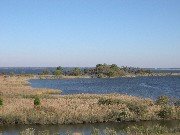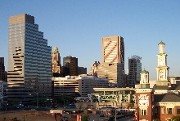Immigration to the Bay
As the immigration debate continues to divide the Nation, an immigrant species of crab from China could threaten the Bay’s ecosystem.
Originally posted at Outside the Beltway
Fisheries experts across the Chesapeake Bay went on alert yesterday after scientists identified a second Chinese mitten crab, raising questions that the species could threaten the bay's already struggling native crabs and shellfish and further harm its ecosystem.The mitten crab has become a legitimate threat in San Francisco:
Like the bay's beloved blue crab, the mitten crab -- a native of China and the Korean Peninsula named for the furry growths on its pincers -- eats small worms and juvenile shellfish. It prefers habitat similar to native crabs', and under the right conditions can breed furiously.
That all raises fears that if it manages to establish itself, the mitten crab would eat already scarce oyster populations and compete for food with the blue crab, the region's marquee species and its most lucrative aquatic commodity…
"The last thing we need is one more introduction in the bay, which may be the final nail in the coffin for some native species on the verge of collapse or decline," said Rom Lipcius, a researcher at the Virginia Institute for Marine Science. "To me, it's unlikely that there's already a population . . . [but] the urgency is to find out how these crabs got there and stop it."
The mystery of the crabs' appearance began when a waterman caught a funny-looking crab near the mouth of the Patapsco River and handed it over to Steve Takos, a volunteer ranger at North Point State Park near Baltimore. Takos recalls the incident as taking place in 2003, but Ruiz said the waterman told him he caught it last summer.
The mitten crab is fully established in San Francisco Bay, where it was first found in the early 1990s and is believed to have arrived in ship ballast water.The crabbing industry and other Bay jobs are already threatened by pollution, global warming, over development and enormous corporate fish farms. I like to think that I'm pro-immigrant and support an open borders policy (after all, my great grandparents came here from Ireland and Italy at a time when neither 'race' was very popular), but I would fully support the exportation of all Chinese mitten crabs from the Chesapeake Bay.
"They are quite problematic. They are very aggressive crabs and compete with our native crabs," said Andrea Swensrud, program manager at the Marine Science Institute in Redwood City, Calif.
The crabs also burrow into levees and banks to make their homes, contributing to erosion and potential flooding problems, she said. In Europe, they weaken dams and clog water intake pipes.
Originally posted at Outside the Beltway






0 Comments:
Post a Comment
<< Home